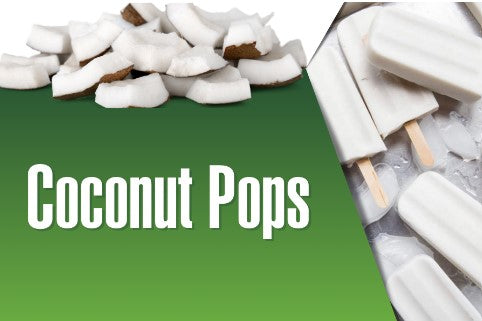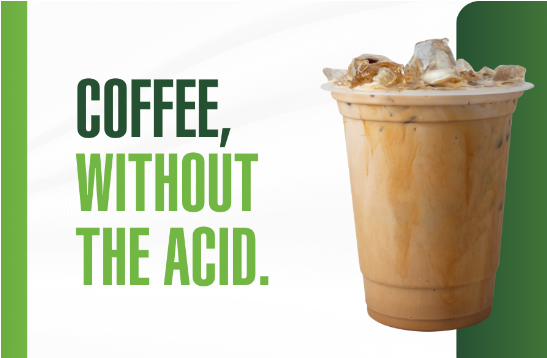Your body reacts to the same foods differently as you age
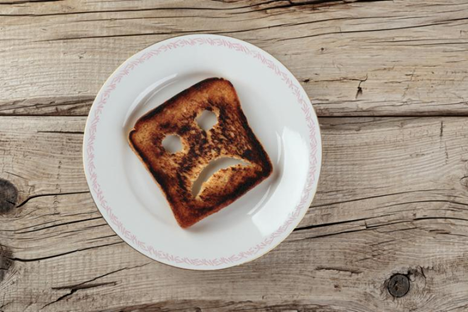
Humans’ genes have not changed for thousands of year; only lifestyle has. And it makes all the difference. How healthy people are almost entirely depends on what they put in their bodies.
The most important foods to avoid are the acid-forming foods, Dr. Daryl Gioffre, celebrity nutritionist and author of GET OFF YOUR ACID. The biggest offenders are sugar, grain, dairy, artificial sweeteners, processed foods, unhealthy fats, soda and caffeine.
They have a stacking effect. They build up in the body and cause more toxicity and inflammation. All of these can cause digestive issues and weight gain in the short term but can lead to serious health conditions such as cancer and diabetes in the long run.
Anytime something acidic is introduced into your body, it has a buffer system to help neutralize those acids. One of those primary buffers is fat, Dr. Gioffre adds.
“Your body would rather hold onto fat, encapsulating the acid or toxin, in order to protect the body from being harmed or damaged.” It is a self-protective mechanism designed to keep you healthy, in the short run. In the long run, it makes you heavier and more toxic, he says.

Milk
“Dairy products are highly acidic and they need to be avoided,” Dr. Gioffre, says. Milk is homogenized and pasteurized, killing most of the nutrients right along with any bad bacteria. “You flat out don’t need it,” he adds.
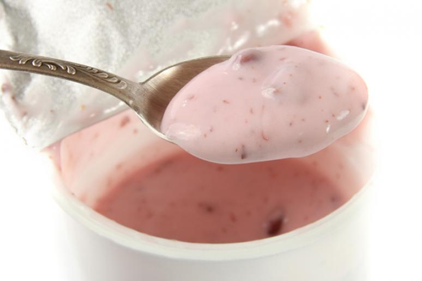
Flavored yogurt
If you want to eat yogurt and fruits, you are better off purchasing them separately and mixing them in a bowl. Flavored yogurts are often filled with added sugar. Just a small 8-ounce serving of the sweet dessert can have as many as 47 grams of sugar. The American Heart Association recommends for men 38 grams and women 25 grams of added sugar a day.

Soda
The high fructose corn syrup found in soda is by far the worst thing about it, Dr. Gioffre says. “It is the most dangerous because it goes directly to the liver and is stored as fat,” he adds. It also creates resistance to leptin, a hormone that decreases appetite. The condition is the main driver of fat gain in people.

Artificial sweeteners
Reducing the sugar content in products comes at a price. Artificial sweeteners are added to preserve the taste, but they have been shown to cause even more damage than sugar itself. New research suggests that one of the negative side effects is eating more. Splenda is among the worst, Dr. Gioffre says, as it has been linked to different types of cancer. However, more studies need to be done to confirm a connection.

Beer
Beer is among the worst kinds of alcohol you can consume, according to Dr. Gioffre. It’s basically fermented grains, which means it contains fungus. The darker the beer, the higher the mold content. Also, certain carbohydrates cause your body’s insulin level to spike. These include anything made of grains – such as beer.

Soy
It is genetically modified so much. It can increase inflammation in the body which leads to a thyroid imbalance,” Dr. Prudence Hall from The Hall Center says. The plant-based phytoestrogen found in soy can interfere with your body's ability to use thyroid hormone. Avoid soy if you already have problems with the gland.

Energy drinks
Energy drinks are infamously popular and notoriously bad for you, mostly because they are full of sugar. Your endothelial function is acutely worse after consuming the beverage, according to a study. Cardiac blood vessels become sluggish and don’t open as well. Make a healthy one yourself.

Anything with a straw
This causes premature aging. This may come as a shock but think about it: What do your lips do when you are drinking through a straw? You purse them. Do that too many times and you’ll start to see lip lines and wrinkles after a while because of the repetitive muscle motion. These lines will become even more obvious as you age because the skin loosens.
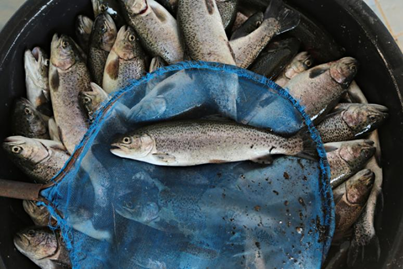
Farmed fish
To be healthy fish basically has to be flown in over-night from the ocean, Angela Martindale, a celebrity nutritionist says. “If you’re looking for fish to make at home, make sure that you always ask the seller where the fish came from, and try to buy it from a fresh fish market - you never want farmed fish,” she adds. In a farm environment, fish are so compact that they eat one another’s feces and those bacteria become a toxic part of your dinner.

Fruit juices
They are among the worst drinks for your body. Fruit juices in stores are pasteurized, which means that all nutrition that is heat- sensitive gets destroyed and what remains is just lots of sugar, Carly Pollack, certified clinical nutritionist, says. Fiber, which makes us full and slows the absorption of sugar into the bloodstream, is gone.

Commercial cookies
They are high in calories, fat and sugar. The worst culprit is hydrogenated oil. This is a kind of trans fat that is really bad for you; they raise LDL (the bad) cholesterol levels. Companies don’t have to list trans fats on the ingredient label unless there are more than 0.5g.Make cookies at home because then you’re more likely to use less sugar and butter.

Canned soup
Canned soups – and everything in a can for that matter – have a lot of sodium because that’s how the product is preserved. You probably didn’t know that sugar is also used for the same purpose. Just one can of Campbell’s classic tomato soup-on-the-go has 20 grams of sugar — the same amount of sugar as two donuts.
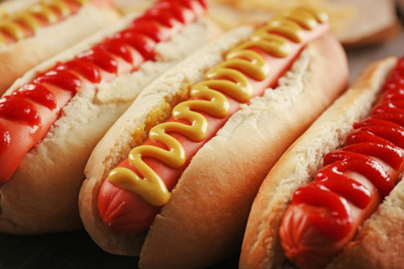
Hot dogs
Nitrates help them keep their color for longer but they are not doing your body any favors. They can convert to nitrite, causing the formation of nitrosamines, which are carcinogenic chemicals, according to the CDC. Hot dogs are also extremely high in sodium, which leads to dehydrationand dry and old-looking skin.

Cold cuts
These processed meats are very high in sodium and fat. Consuming too much of it can lead to hypertension and damaged blood vessels, among other serious health problems. They are among the worst foods for the heart.

Microwave dinners
These fit into the “anything in a box” which you probably know is not a good category. In general, prepackaged meals are preserved with too much sodium and are very high in calorie content. Some have as much as 1,800 mg. The extra salt will cause the body to retain water, leaving you bloated, at the very least.
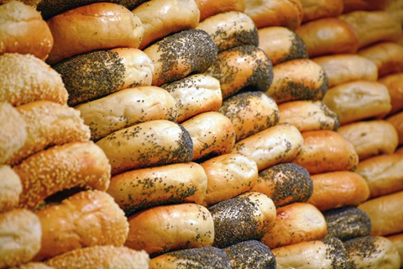
Bagels
Almost no one wants to be told that bagels are off limits, but you should cut them. It’s empty calories and a lot of salt. A bagel is roughly 250 calories and provides almost no nutrients, or fiber. Even a 100% Whole Wheat bagel has 565 mg of sodium. Depending on what you’re putting on them, you can consume almost a whole day’s worth of salt in one meal.
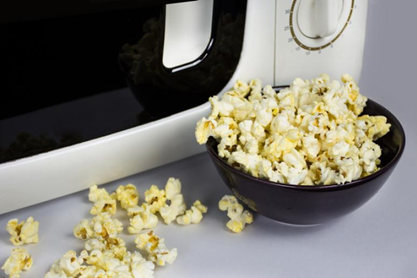
Microwave popcorn with butter
They are literally damaging your brain. The problem is trans fats, which decrease brainpower and zap memory. Trans fat can cause cellular destruction, wreak havoc on hormone production, adversely affect memory and increase inflammation in the brain. This inhibits the body’s production of Omega 3 fatty acids, which are essential to brain function, according to Psychology Today.

Margarine
This is just chemicals. There is nothing in it that is good for the body. It’s full of bad fats that dehydrate you, causing wrinkles. A study showed that higher consumption of margarine was linked to increased skin wrinkling. Margarine is made of vegetable oils, which are high in polyunsaturated fats. They lead to inflammation and cell mutation, which are linked to many health issues.

Foods containing bleached flour
Bleached flour is treated with chemical agents to speed up aging. It is more processed and contains less wholesome nutrients. Any food can be healthy but it all depends on what it’s made of, Vicki Tri from Fit w/ Vic in Oklahoma City says.
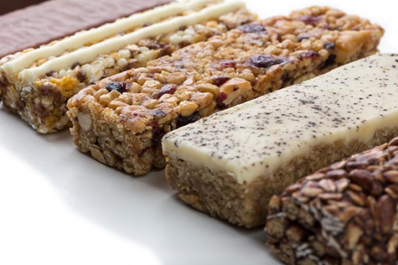
Protein breakfast bars
Some nutritionists call them “glorified candy bars.” There are so many options for protein bars and meal replacement bars in stores today. Many contain more than 200 calories per serving, and over 8-10 grams of sugar. They should be avoided at all costs.

Diet foods
Some of you may think that having fat-free or low-fat foods is acceptable. But you’re being misled. Something everyone needs to know about ‘fat free’ anything is that it doesn’t work, Dr. Gioffre says. The sugar and fat is replaced with artificial substances which can play tricks on the brainin a way worse than actual sugar.

Foods with too many ingredients
If a food’s ingredients label is a paragraph long and full of things the names of which you can’t even pronounce, then you can be fairly certain your body does not need it. Thake pop tarts, for example. The list of ingredients in pop tarts seems endless. It’s so long, you probably won’t even finish reading it.
“Enriched flour (wheat flour, niacin, reduced iron, vitamin b1 [thiamin mononitrate], vitamin b2 [riboflavin], folic acid), corn syrup, high fructose corn syrup, dextrose, soybean and palm oil (with tbhq for freshness), sugar, cracker meal, contains two percent or less of wheat starch, salt, dried strawberries, dried pears, dried apples, leavening (baking soda, sodium acid pyrophosphate, monocalcium phosphate), citric acid, milled corn, gelatin, soybean oil, modified corn starch, caramel color, soy lecithin, xanthan gum, modified wheat starch, vitamin a palmitate, red 40, niacinamide, reduced iron, color added, turmeric extract, vitamin b6 (pyridoxine hydrochloride), yellow 6, vitamin b2 (riboflavin), vitamin b1 (thiamin hydrochloride), blue 1.”

White bread
“Stick to whole grain, fiber rich carbohydrates such whole wheat bread,” Dr. Caroline Cederquist, founder of bistroMD, says. “Stay away from breads that don’t provide any nutritional value, like white bread; there's typically less fiber and less nutritional benefits.
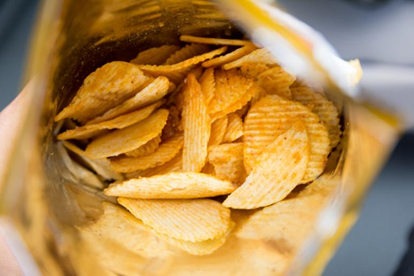
Chips
Potato chips are often made with olestra, a fat substitute that adds no fat, calories or cholesterol. But it sticks to vitamins A, E, D and K and carotenoids, which are antioxidant nutrients, and flushes them out of the body, according to a study. Carotenoids provide important antioxidants to help prevent premature skin damage and skin cancer. Also, a recent study found that refined carbs were the main culprit in acne.

Fried foods
“The body likes healthy fats like omega-3s in fish, olive and coconut oil,” Dr. Hall says. “But the second you start to fry foods, the oil becomes carcinogenic,” she adds. Avoid anything that is deep fried and if you must fry, use coconut oil, she adds. Fats in general disrupt the thyroid's ability to produce enough hormone.

Ice cream
“Every time I see an overweight patient, my first question is ‘If I open your fridge, will I find ice cream?’ The answer usually is ‘yes,’” Dr. David Fischman, co-director of the Cardiac Catheterization Laboratory at Thomas Jefferson University, says. “Get rid of it.” It is very high in calories and fat, and it contributes to high cholesterol levels. According to myfitnesspal, half a cup of vanilla ice cream contains 145 calories, 58mg of sodium, 8g of fat, 17g of carbs, and 32mg of cholesterol.

Non-organic produce
Some fruits contain significant pesticide residue when grown conventionally. These pesticides can be dangerous for your health. By the time you turn 30 your body has been collecting these toxins for a while, which can lead to slower metabolism and out of balance hormone levels. Buy organic fruits and vegetables whenever you can.

Bacon
There is too much fat in bacon, Dr. Fischman says. The enormous amount of nitrates doesn’t make the food any better. It’s “bad for the heart (cholesterol and saturated fat) and the worst for weight loss. SO don’t add it to your salad, even if the rest of it is all greens.

Coffee creamer
The problem is titanium dioxide, which is an additive that has been shown to cause liver and tissue damage in mice. The additive is the most widely used white pigment. If that’s not enough, liquid coffee creamers are loaded with sugar, artificial sweeteners, and trans fats. You’ll recognize them by the name “hydrogenated oil” written on the label.

Sugar alcohols
They are typically found in sugar-free gym and other similar products. Two types of sugar alcohols – Xylitol and Sorbitol – are used in sugar-free foods, and they are harmful to tooth enamel. The two have a third of the calories that sugar does which is why they are used in diet soda drinks.
https://www.theactivetimes.com/content/30-foods-you-should-never-eat-after-30/slide-31
 Skip to content
Skip to content



